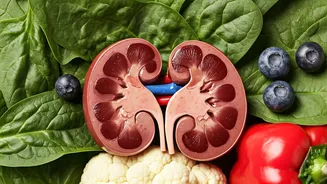Kidney Health: An Overview
Kidneys play a crucial role in filtering waste and excess fluids from the blood, maintaining the balance of electrolytes and managing blood pressure. They
are vital for removing toxins and harmful substances. Without proper kidney function, the body accumulates waste, leading to various health complications. Damage to the kidneys can often go unnoticed in the early stages, making preventative measures extremely important. Factors like high blood pressure, diabetes, and unhealthy diets can increase the risk of kidney disease. Therefore, incorporating kidney-friendly foods into your daily routine is an essential step towards maintaining optimal kidney health and preventing potential damage. Being mindful of what you eat can support the kidneys in their essential tasks. Regularly consuming a balanced diet rich in specific nutrients is key to supporting and maintaining kidney function.
1. Red Grapes
Red grapes are a good source of antioxidants, particularly flavonoids, which help protect cells from damage. The antioxidants found in red grapes can help reduce inflammation and oxidative stress, both of which are contributing factors to kidney disease. They are also known for their anti-inflammatory properties that can help safeguard the kidneys. You can enjoy red grapes as a snack, or add them to your salads and breakfast. Their natural sweetness also makes them a great alternative to processed snacks. Grapes are not only beneficial for kidney health, but also contribute to overall well-being by improving cardiovascular function and protecting against various chronic diseases. They can improve overall health by incorporating them into a well-rounded diet that supports the health of the kidneys.
2. Blueberries
Blueberries are packed with antioxidants, especially anthocyanins, which give them their vibrant color. These antioxidants help combat free radicals, protecting the kidneys from damage. They are naturally anti-inflammatory and can aid in reducing the inflammation that contributes to kidney disease. Blueberries are also low in sodium, phosphorus, and potassium, making them a suitable option for those managing kidney issues. Adding blueberries to your diet is easy; you can add them to smoothies, yogurt, or eat them as a snack. They are also versatile and can be used in various recipes, providing a delicious and healthy addition to meals. Their nutritional benefits extend beyond kidney health, contributing to improved cognitive function and heart health.
3. Cabbage
Cabbage is a low-potassium vegetable, making it an excellent choice for kidney health. It is a good source of vitamins C, K, and B6. These nutrients contribute to overall well-being and provide essential support to kidney function. Cabbage contains antioxidants that help eliminate harmful free radicals. Its low potassium content prevents the buildup of excess potassium in the blood, which can be problematic for individuals with kidney problems. You can add cabbage to your diet in various ways; it can be eaten raw in salads or cooked in stir-fries. Eating cabbage is also beneficial for digestive health due to its fiber content. It supports overall health by including it in your regular diet and supporting your kidney function.
4. Cauliflower
Cauliflower is another low-potassium vegetable that is beneficial for kidney health. It is a good source of vitamin C, fiber, and folate. Its nutrients support kidney function and protect against oxidative stress. Cauliflower contains compounds that help detoxify the body. It supports the kidneys in their natural cleansing processes. You can enjoy cauliflower raw in salads or cooked as a side dish. Cauliflower can be roasted, steamed, or added to soups and stews. Consuming cauliflower also offers digestive benefits and provides a good source of dietary fiber. It is a versatile and nutritious option for maintaining overall health and supporting the kidneys.
5. Garlic
Garlic is well-known for its medicinal properties and can play a beneficial role in kidney health. It has anti-inflammatory properties and helps lower cholesterol levels, reducing the risk of kidney disease. It contains allicin, a compound known for its antioxidant and anti-inflammatory effects. Garlic also helps to regulate blood pressure, which is essential for kidney health. You can add garlic to your daily diet by using it in cooking various dishes. You can add it to sauces, soups, and marinades. Garlic also contributes to heart health and boosts the immune system. Integrating garlic into your meals is an easy way to support kidney function and enhance overall health.













